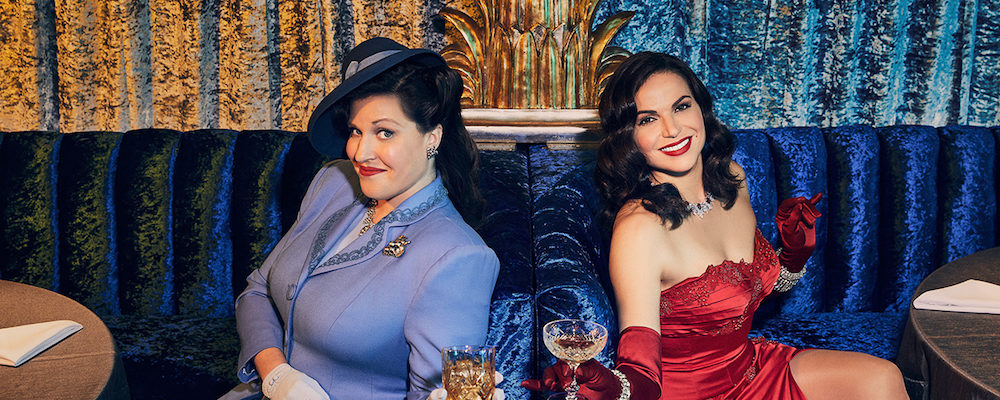In ‘Why Women Kill’ Season 2, Murder Is a Common Accessory
Tony Sokol
“When we got married, he said he’d never make it to 70,” Mrs. Rita Castillo (Lana Parrilla) tells her private gumshoe Vern (Jordane Christie) in the season two opening episode of “Why Women Kill.” “He’s 80. If he doesn’t keep his wedding vows, why should I?” This is one of the many reasonable motives for lethal force presented in the second season of the sardonically stylized comedy series.
Unlike the premiere season, which slipped through the generation gaps of a 1960s housewife, a 1980s socialite and a present-day lawyer, season 2 of “Why Women Kill” is set in 1949 Los Angeles. It is the beginning of the post-war boom when Joneses were neighbors to keep up with. The main protagonist, a housewife named Alma Fillcot (Allison Tolman), wants to be in the running, but doesn’t have the shoes. “You’re a frump,” she is told by her buttinsky neighbor Mrs. Yost, who allows Alma’s comfort clothes to illustrate the point. “They don’t let frumps into the garden club.”
The series comes from “Desperate Housewives” creator Marc Cherry, and bears its mark. It is brightly dark, lightly naughty, and very campy. The volume on everyone’s snark is turned up to 9 most of the time. The series is filled with exceptionally sharp barbs, which trip off the tongues of a wide variety of characters. “Violence doesn’t bother me,” Alma’s waitress daughter Dee (B.K. Cannon) advises a customer. “Keep that in mind when you tip me.” An upscale shop girl sniffs “If you can’t afford fashion, you must settle for clothes,” to unworthy clientele.
“You’ve gotten away with how many murders? Honestly, I don’t know how you managed without me,” Alma asks her husband Bertram (Nick Frost). He is the “kindest man she’d ever know,” a veterinarian who puts more than beloved pets to sleep. The series is snidely narrated by Jack Davenport, who played Karl Grove in the first season. His voice drips with equal parts insinuation and boredom, even as he introduces us to Alma, “a very meek woman who one day got tired of waiting.” Talman brings a relatable vulnerability. Frost delivers humanity, though he often pockets a trinket as a carrying charge. They play off each other splendidly. His origin story is touching, including why he keeps souvenirs. When Alma learns his secret, she is afraid to even drink his tea. She later realizes how useful even the most distasteful things can be.
They are both Bud Abbotts masquerading as Costellos, the straight man and woman, to everyone’s sad clown. Each of the ensemble cast gets fleshed out, and most hide a hidden truth. Of course, the Elysian Park Garden Club, the center of Alma’s upwardly mobile fixation, would never want to be associated with a public scandal. But, like a mysterious box of trinkets found hidden in an attic, private associations abound.
The 1940s setting makes it perfect for the noir world of Hollywood. We see hints of films like “Double Indemnity” and “The Postman Always Rings Twice.” Rita wears her hair like Veronica Lake, and when she talks to herself in the mirror it looks like she’s flashing back to her Evil Queen character in “Once Upon a Time,” but this is not the usual fairy tale. The wealthy Carlo Castillo purchased Rita, wholesale, off the rack, like a suit. His daughter, Catherine (Veronica Falcón) sees Rita as a gold-digging femme fatale. Each of the characters have deep pain in the past, or coming in the foreseeable future. Catherine will be cut out of her father’s will if she falls in love with a sugar baby. The boytoy Rita has been grooming is cheating on her with a full-figured waitress.
Dee says she was raised to believe she should settle for what she could get, but knows the power of owning a beautiful man, and not because she bought him, or could buy things for him. Scooter (Matthew Daddario) is a surprisingly well-rounded character for a pretty boy. He is upfront about his ambition, and the lack of ambition which means he’ll always need someone to give him what he needs. But he also seems to see beyond his self-absorbed persona. There is a reason Dee can own him. He sees her at least well enough to let her know she can do a lot better than him. Vern and Dee’s romantic arc is the only unironic flowline in the series. It is strongly character building and sweetly told. It informs, but is only occasionally affected by, the outside chaos.
The sets and costume design are so flawless they can be mistaken for parody. “I’d be happy every day of my life if I had a group of elegant friends like that,” Alma says, without a hint of sarcasm. Yet, even as she becomes the person she always wanted to be, the silverware never tarnishes. “Why Women Kill” revels in its contrivances. Everything is drawn into the center of gravity. Even Bertram’s “calling” will ultimately be helpful, but only when things are at their most inconvenient. Serial killers come in so handy, so often, on all media so much of the time. It’s about time one spent time with his wife. Even his father’s confessor believes in her absolutely divine guidance.
“Why Women Kill” will make for a fun binge as you wait for a murder spree. It is lethal cotton candy served in a crystal bowl. It is too self-consciously clever to be truly suspenseful, but captures the perils of a long-lost suburban status symbol quo. Innocence and deviousness play patty cake, cooked in an easy bake oven, and served up at charity drives. Punishment is doled out with the aperitif, and glamour is its own reward.
“Why Women Kill” begins streaming June 3 on Paramount+.

